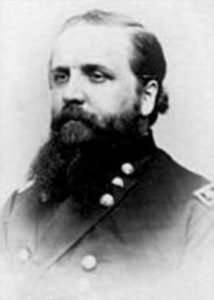
Clinton Fisk
Clinton Fisk was born on this date in 1828. He was a white-American soldier, prohibitionist, businessman, and educator.
Born near the Erie Canal in Western New York, Clinton Bowen Fisk was the son of Benjamin Bigford Fisk and Lydia Aldrich Fisk. His parents moved to Michigan Territory while he was a baby, and his father’s death caused him and his family to grow up impoverished.
Young Fisk established himself as a small banker in Coldwater, Michigan, where he married Jeannette Crippen in 1850. Fisk’s bank business was ruined in the economic Panic of 1857.
He was a resourceful man who reestablished himself in St. Louis by the start of the American Civil War. He served in the home guards, seizing Camp Jackson in May 1861. During the summer of the following year, Fisk recruited and organized the 33rd Missouri Volunteers and was promoted that November to brigadier general. He mustered out in 1865 as a major general.
After the war, Fisk was appointed to the Freedman’s Bureau. He came on board as assistant commissioner of the Bureau of Refugees, Freedmen, and Abandoned Lands for Kentucky and Tennessee. It was here in 1866 that he opened a school for freedmen in an abandoned army barracks in Nashville, Tennessee. The institution was chartered in his name as Fisk University later that year. Soon after, Fisk returned to banking in New York until 1874, when he was appointed to the Board of Indian Commissioners. He was president of the board from 1881 until 1890.
In 1882, Fisk was appointed as a trustee of Dickinson College. Six years later, in 1888, Fisk ran for president of the United States on a Prohibition Party ticket, gaining 250,000 votes.
Clinton Fisk died on July 9, 1890.
The World Book Encyclopedia.
Copyright 1996, World Book, Inc.
ISBN 0-7166-0096-X